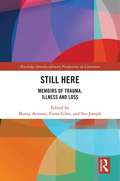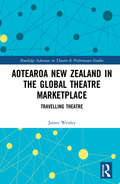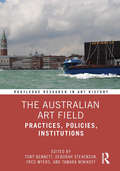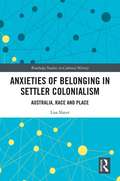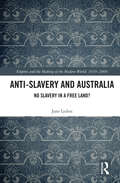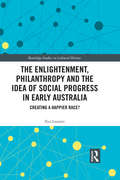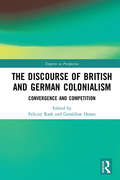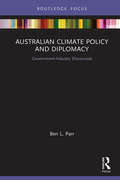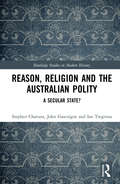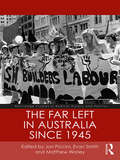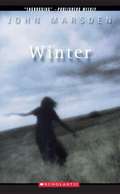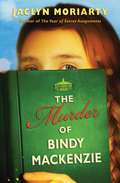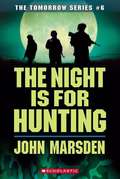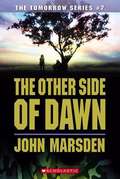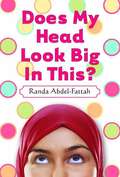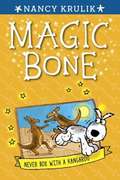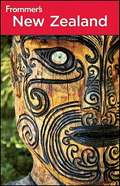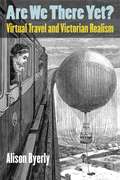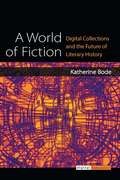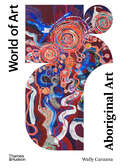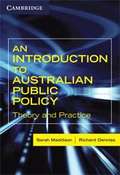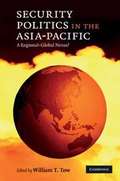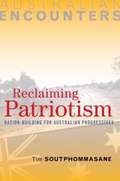- Table View
- List View
Still Here: Memoirs of Trauma, Illness and Loss (Routledge Interdisciplinary Perspectives on Literature)
by Fiona Giles Bunty Avieson Sue JosephStill Here: Memoirs of Trauma, Illness and Loss explores the history, ethics, and cross-cultural range of memoirs focusing on illness, death, loss, displacement, and other experiences of trauma. From Walt Whitman’s Civil War diaries to kitchen table survivor-to-survivor storytelling following Hurricane Katrina, from social media posts from a refugee detention centre, to poetry by exiles fleeing war zones, the collection investigates trauma memoir writing as healing, as documentation of suffering and disability, and as political activism. Editors Bunty Avieson, Fiona Giles and Sue Joseph have brought together this scholarly collection as a sequel to their earlier Mediating Memory (Routledge 2018), providing a closer look at the specific concerns of trauma memoir, including conflict and intergenerational trauma; the therapeutic potential and risks of trauma life writing; its ethical challenges; and trauma memoir giving voice to minority experiences.
Aotearoa New Zealand in the Global Theatre Marketplace: Travelling Theatre (Routledge Advances in Theatre & Performance Studies)
by James WenleyAotearoa New Zealand in the Global Theatre Marketplace offers a case study of how the theatre of Aotearoa has toured, represented and marketed itself on the global stage. How has New Zealand work attempted to stand out, differentiate itself, and get seen by audiences internationally? This book examines the journeys of a dynamic range of culturally and theatrically innovative works created by Aotearoa New Zealand theatre makers that have toured and been performed across time, place and theatrical space: from Moana Oceania to the Edinburgh Festival Fringe, from a Māori Shakespeare adaptation to an immersive zombie theatre experience. Drawing on postcolonialism, transnationalism, cosmopolitanism and globality to understand how Aotearoa New Zealand has imagined and conceived of itself through drama, the author investigates how these representations might be read and received by audiences around the world, variously reinforcing and complicating conceptions of New Zealand national identity. Developing concepts of theatrical mobility, portability and the market, this study engages with the whole theatrical enterprise as a play travels from concept and scripting through to funding, marketing, performance and the critical response by reviewers and commentators. This book will be of global interest to academics, producers and theatre artists as a significant resource for the theory and practice of theatre touring and cross-cultural performance and reception.
The Australian Art Field: Practices, Policies, Institutions (Routledge Research in Art History)
by Tony Bennett Deborah Stevenson Fred Myers Tamara WinikoffThis book brings together leading scholars and practitioners to take stock of the frictions generated by a tumultuous time in the Australian art field and to probe what the crises might mean for the future of the arts in Australia. Specific topics include national and international art markets; art practices in their broader social and political contexts; social relations and institutions and their role in contemporary Australian art; the policy regimes and funding programmes of Australian governments; and national and international art markets. In addition, the collection will pay detailed attention to the field of indigenous art and the work of Indigenous artists. This book will be of interest to scholars in contemporary art, art history, cultural studies, and Indigenous peoples.
Anxieties of Belonging in Settler Colonialism: Australia, Race and Place (Routledge Studies in Cultural History #65)
by Lisa SlaterThis book analyses the anxiety "well-intentioned" settler Australian women experience when engaging with Indigenous politics. Drawing upon cultural theory and studies of affect and emotion, Slater argues that settler anxiety is an historical subjectivity which shapes perception and senses of belonging. Why does Indigenous political will continue to provoke and disturb? How does settler anxiety inform public opinion and "solutions" to Indigenous inequality? In its rigorous interrogation of the dynamics of settler colonialism, emotions and ethical belonging, Anxieties of Belonging has far-reaching implications for understanding Indigenous-settler relations.
Anti-Slavery and Australia: No Slavery in a Free Land? (Empire and the Making of the Modern World, 1650-2000)
by Jane LydonBringing the histories of British anti-slavery and Australian colonization together changes our view of both. This book explores the anti-slavery movement in imperial scope, arguing that colonization in Australasia facilitated emancipation in the Caribbean, even as abolition powerfully shaped the Settler Revolution. The anti-slavery campaign was deeply entwined with the administration of the empire and its diverse peoples, as well as the radical changes demanded by industrialization and rapid social change in Britain. Abolition posed problems to which colonial expansion provided the answer, intimately linking the end of slavery to systematic colonization and Indigenous dispossession. By defining slavery in the Caribbean as the opposite of freedom, a lasting impact of abolition was to relegate other forms of oppression to lesser status, or to deny them. Through the shared concerns of abolitionists, slave-owners, and colonizers, a plastic ideology of ‘free labour’ was embedded within post-emancipation imperialist geopolitics, justifying the proliferation of new forms of unfree labour and defining new racial categories. The celebration of abolition has overshadowed post-emancipation continuities and transformations of slavery that continue to shape the modern world.
The Enlightenment, Philanthropy and the Idea of Social Progress in Early Australia: Creating a Happier Race? (Routledge Studies in Cultural History #63)
by Ilya LazarevThis book seeks to highlight the influence of the Enlightenment idea of social progress on the character of the "civilising mission" in early Australia by tracing its presence in the various "civilising" attempts undertaken between 1788 and 1850. It also represents an attempt to marry the history of the British Enlightenment and the history of settler-Aboriginal interactions. The chronological structure of the book, as well as the breadth of its content, will facilitate the readers’ understanding of the evolution of "civilising attempts" and their epistemological underpinnings, while throwing additional light on the influence of the Enlightenment on Australian history as a whole.
The Discourse of British and German Colonialism: Convergence and Competition (Empires in Perspective)
by Felicity RashThis volume compares and contrasts British and German colonialist discourses from a variety of angles: philosophical, political, social, economic, legal, and discourse-linguistic. British and German cooperation and competition are presented as complementary forces in the European colonial project from as early as the sixteenth century but especially after the foundation of the German Second Empire in 1871 – the era of the so-called 'Scramble for Africa'. The authors present the points of view not only of the colonizing nations, but also of former colonies, including Cameroon, Ghana, Morocco, Namibia, Tanzania, India, China, and the Pacific Islands. The title will prove invaluable for students and researchers working on British colonial history, German colonial history and post-colonial studies.
Australian Climate Policy and Diplomacy: Government-Industry Discourses (Routledge Focus on Environment and Sustainability)
by Ben L. ParrAustralian Climate Policy and Diplomacy provides a well overdue critique of existing, and high-profile, publications that convey the ‘greenhouse mafia’ hypothesis, which posits that Australia’s weak policy response to climate change is the result of a menacing domestic fossil fuel lobby. Ben L. Parr argues that the shared government–industry discourse about protecting Australia’s industrial competitiveness has had a more decisive influence in shaping and legitimising Australian climate policy than the direct lobbying tactics of the fossil fuel industry. Parr also reveals how the divergent foreign policy discourses and traditions of Australia’s two major political parties – as internationalist versus alliance-focused – have enabled and constrained their climate diplomacy and domestic policies over time. To demonstrate his argument, he presents a discourse analysis woven into a chronological policy narrative, comprising more than 1000 primary texts (media releases, interviews, and speeches) generated by prime ministers and key fossil fuel lobbyists. Overall, this volume illustrates how domestic forces have and are influencing Australia’s climate policy. In doing so, it also provides a framework that can be adapted to examine climate mitigation policies in other countries, notably Canada and the US. This book will be of interest to students and scholars of climate change, environmental policy and governance, and Australian climate change policy and politics more specifically, as well as policymakers and practitioners working in these fields.
Reason, Religion and the Australian Polity: A Secular State? (Routledge Studies in Modern History)
by John Gascoigne Stephen A. Chavura Ian TregenzaHow did the concept of the secular state emerge and evolve in Australia and how has it impacted on its institutions? This is the most comprehensive study to date on the relationship between religion and the state in Australian history, focusing on the meaning of political secularity in a society that was from the beginning marked by a high degree of religious plurality. This book tracks the rise and fall of the established Church of England, the transition to plural establishments, the struggle for a public Christian-secular education system, and the eventual separation of church and state throughout the colonies. The study is unique in that it does not restrict its concern with religion to the churches but also examines how religious concepts and ideals infused apparently secular political and social thought and movements making the case that much Australian thought and institution building has had a sacral-secular quality. Social welfare reform, nationalism, and emerging conceptions of citizenship and civilization were heavily influenced by religious ideals, rendering problematic traditional linear narratives of secularisation as the decline of religion. Finally the book considers present day pluralist Australia and new understandings of state secularity in light of massive social changes over recent generations.
The Far Left in Australia since 1945 (Routledge Studies in Radical History and Politics)
by Evan Smith Jon Piccini Matthew WorleyThe far left in Australia had significant effects on post-war politics, culture and society. The Communist Party of Australia (CPA) ended World War II with some 20,000 members, and despite the harsh and vitriolic Cold War climate of the 1950s, seeded or provided impetus for the re-emergence of other movements. Radicals subscribing to ideologies beyond the Soviet orbit – Maoists, Trotskyists, anarchists and others – also created parties and organisations and led movements. All of these different far left parties and movements changed and shifted during time, responding to one political crisis or another, but they remained steadfastly devoted to a better world. This collection, bringing together 14 chapters from leading and emerging figures in the Australian and international historical profession, for the first time charts some of these significant moments and interventions, revealing the Australian far left’s often forgotten contribution to the nation’s history.
Winter
by John MarsdenFor 12 years Winter has been haunted. And now, at 16, she must head back to her old home, where a pair of family tragedies forever altered her life. What she discovers is powerful and shocking but must be dealt with in order for life to go on.
The Murder of Bindy Mackenzie
by Jaclyn MoriartyBindy Mackenzie is the most perfect girl at Ashbury High. She scores in the 99.9th percentile in all her classes. Clearly, Bindy has everything under control...Until her oh-so-perfect life starts falling oh-so-perfectly apart. She falls asleep in class. She fails an exam for the first time ever. And she can't stop thinking about handsome Finnegan Blonde. Is it a conspiracy? Madness? Or even murder? The clues are in Bindy's transcripts. The detectives are her fellow students. But Bindy has made every one of them into an enemy...and time is running out.
The Night Is for Hunting (The Tomorrow Series #6)
by John MarsdenAmidst a brutal war with no end in sight, Ellie and her four remaining friends discover that their hidden refuge becomes a crowded place when they decide to care for an uncooperative crew of orphans. Things only get worse when Ellie and Homer learn that mysterious visitors have discovered their sanctuary. Has the enemy found them out? Five ordinary teens brave the worst in this electrifying continuation of their battle to stay safe and sane in a war zone that was once their home.
The Other Side of Dawn (The Tomorrow Series #7)
by John MarsdenSince their home was invaded by enemy soldiers and transformed into a war zone, Ellie and her friends have been fighting for their lives. Now a resolution may finally be in sight. But as enemy forces close in on her hideout, Ellie discovers that the final conflict just may be the most dangerous yet. And not everyone will survive. Nobody is safe in this exhilarating conclusion to Ellie's courageous struggle for freedom.
Does My Head Look Big In This?
by Randa Abdel-FattahWhen sixteen-year-old Amal decides to wear the hijab full-time, her entire world changes, all because of a piece of cloth ... Sixteen-year-old Amal makes the decision to start wearing the hijab full- time and everyone has a reaction. Her parents, her teachers, her friends, people on the street. But she stands by her decision to embrace her faith and all that it is, even if it does make her a little different from everyone else. Can she handle the taunts of "towel head," the prejudice of her classmates, and still attract the cutest boy in school? Brilliantly funny and poignant, Randa Abdel-Fattah's debut novel will strike a chord in all teenage readers, no matter what their beliefs.
Never Box with a Kangaroo #11
by Nancy Krulik Sebastien BraunSparky goes down under!When Sparky chomps on his magic bone, this time it kabooms him to Kangaroo Island, Australia! There he discovers a fox terrier puppy named Mick who's lost his family. But Sparky has a plan--he'll help Mick find a new family! They ask everyone they come across: bats, penguins, kangaroos, even bees! But will anyone give Mick a home?
Frommer's New Zealand, 6th Edition
by Adrienne RewiWritten by a New Zealand resident, and full of personal insights and opinions, this guide takes you to one of the world's most exciting ecotourism destinations! It's much more complete and in-depth than its major competition. Whether you're dreaming of hiking along the Marlborough Sound, trout fishing in Lake Rotorua, driving the Milford Road, or feasting on sumptuous green-lipped mussels or succulent lamb, this detailed guide will help you plan the trip of a lifetime. You'll find the latest on nightlife in Auckland and Wellington and the best places to lay your head after an adventure-filled day, too. Frommer's New Zealand also features gorgeous color photos of the sights and experiences that await you.
Are We There Yet?: Virtual Travel and Victorian Realism
by Alison ByerlyAre We There Yet? Virtual Travel and Victorian Realism connects the Victorian fascination with "virtual travel" with the rise of realism in nineteenth-century fiction and twenty-first-century experiments in virtual reality. Even as the expansion of river and railway networks in the nineteenth century made travel easier than ever before, staying at home and fantasizing about travel turned into a favorite pastime. New ways of representing place—360-degree panoramas, foldout river maps, exhaustive railway guides—offered themselves as substitutes for actual travel. Thinking of these representations as a form of "virtual travel" reveals a surprising continuity between the Victorian fascination with imaginative dislocation and twenty-first -century efforts to use digital technology to expand the physical boundaries of the self.
A World of Fiction: Digital Collections and the Future of Literary History (Digital Humanities)
by Katherine BodeDuring the 19th century, throughout the Anglophone world, most fiction was first published in periodicals. In Australia, newspapers were not only the main source of periodical fiction, but the main source of fiction in general. Because of their importance as fiction publishers, and because they provided Australian readers with access to stories from around the world—from Britain, America and Australia, as well as Austria, Canada, France, Germany, New Zealand, Russia, South Africa, and beyond—Australian newspapers represent an important record of the transnational circulation and reception of fiction in this period. Investigating almost 10,000 works of fiction in the world’s largest collection of mass-digitized historical newspapers (the National Library of Australia’s Trove database), A World of Fiction reconceptualizes how fiction traveled globally, and was received and understood locally, in the 19th century. Katherine Bode’s innovative approach to the new digital collections that are transforming research in the humanities are a model of how digital tools can transform how we understand digital collections and interpret literatures in the past.
Aboriginal Art (World of Art)
by Wally CaruanaAn updated and expanded edition of this classic survey, which has established itself as a superlative introduction to the full diversity of Aboriginal art. This concise survey showcases the incredible, diverse work of Aboriginal and Torres Strait artists. Building on traditions that stretch back at least 50,000 years, these artists have long worked in a variety of contexts from the sacred and secret realm of ceremony to more public spheres. From isolated beginnings to postcolonialism and the present, Wally Caruana explains how Aboriginal and Torres Strait Islander art has continually developed and responded to change; and considers the impact of urban living, the growth of local art centers that support the artists in these communities, and the recognition of women artists. This new edition has been expanded and updated to include and reflect on important artists who have emerged in the last decade, with a focus on the burgeoning of activity in the Southern Desert region, Queensland, and the Torres Strait Islands—all testament to Aboriginal art’s continued dynamism and vitality.
An Introduction To Australian Public Policy
by Sarah Maddison Richard DennissAn Introduction to Australian Public Policy: Theory and Practice is the first book to comprehensively address both the theoretical and practical aspects of policy making in Australia. Written in an accessible style, this text is designed to introduce students to the real world challenges and skills involved in working in a range of policy roles. Drawing on their own experiences, the authors ground public policy theory in a number of key controversies to illustrate the contestable nature of the policy process. Each chapter features case studies that outline contemporary policy issues, such as the deregulation of the financial system, 'Knowledge Nation', paid maternity leave, and the Northern Territory intervention. Including practical exercises on how to write policy briefs and media releases, this book is essential reading for anyone who needs to know how public policy is developed in Australia.
Security Politics in the Asia-Pacific: A Regional-Global Nexus?
by William T. TowAsia is experiencing major changes in its security relations. This book brings together respected experts to assess both the theoretical and empirical dimensions of the Asian security debate. Building on the latest research on Asia's regional security politics, it focuses on the 'regional-global nexus' as a way to understand the dynamics of Asian security politics and its intersection with global security. Contributors to the volume offer diverse but complementary perspectives on which issues and factors are most important in explaining how security politics in Asia can be interpreted at both the regional and global levels of analysis. Issues addressed include power balancing and alliances, governance and democracy, maritime and energy security, the relationship between economics and security, 'human security', terrorism, nuclear non-proliferation, climate change and pandemics. This work will serve as a standard reference on the evolution of key issues in Asian security.
An Introduction to Australian Public Policy
by Sarah Maddison Richard DennissAn Introduction to Australian Public Policy: Theory and Practice is the first book to comprehensively address both the theoretical and practical aspects of policy making in Australia. Written in an accessible style, this text is designed to introduce students to the real world challenges and skills involved in working in a range of policy roles. Drawing on their own experiences, the authors ground public policy theory in a number of key controversies to illustrate the contestable nature of the policy process. Each chapter features case studies that outline contemporary policy issues, such as the deregulation of the financial system, 'Knowledge Nation', paid maternity leave, and the Northern Territory intervention. Including practical exercises on how to write policy briefs and media releases, this book is essential reading for anyone who needs to know how public policy is developed in Australia.
Reclaiming Patriotism Nation-Building for Australian Progressives
by Tim SoutphommasaneAffronted by the xenophobic nationalists who stalked the land during the Howard years, many progressive Australians have rejected a love of country, forgetting that there is a patriotism of the liberal left that at different times has advanced liberty, egalitarianism, and democratic citizenship. Tim Soutphommasane, a first-generation Australian and political philosopher who has journeyed from Sydney's western suburbs to Oxford University, re-imagines patriotism as a generous sentiment of democratic renewal and national belonging. In accessible prose, he explains why our political leaders will need to draw upon the better angels of patriotism if they hope to inspire citizens for nation-building, and indeed persuade them to make sacrifices in the hard times ahead. As we debate the twenty-first century challenges of reconciliation and a republic, citizenship and climate change, Reclaiming Patriotism proposes a narrative we have to have.
Power Crisis
by Rodney CavalierWritten by former minister and Labor historian Rodney Cavalier, Power Crisis is an explosive account of the self-destruction of the New South Wales Labor government, which has seen a turnover of four premiers in five years, and is heading for rejection and even humiliation by voters at the next state election. While the catalyst was the thwarted attempt to privatise electricity, Cavalier reveals that the real issue is the takeover of Labor by a professional political class without connection to the broader community or the party's traditions. Featuring interviews with ex-premiers Iemma and Rees, Power Crisis contrasts the current turmoil and self-indulgence with the stability within New South Wales Labor over generations before, and asks, 'What went wrong?'
